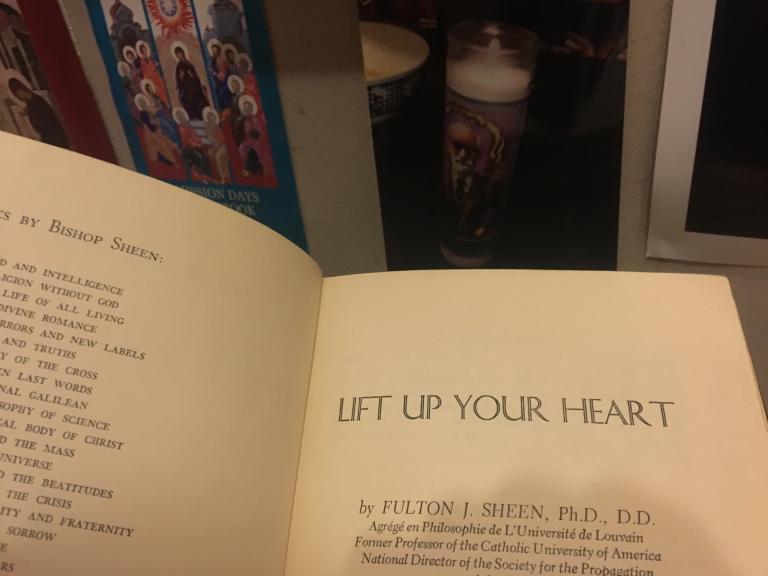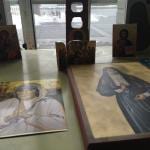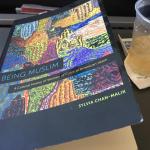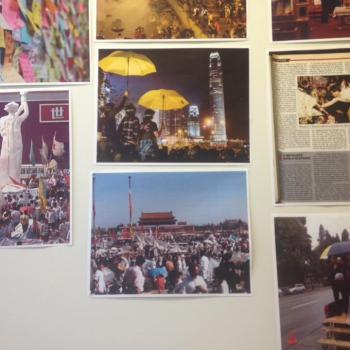
A wise monastic in our church said to me last year in a context outside of the Rite of Repentance and any session resembling spiritual direction that something that I would have to contend with over the course of my academic life is that I am going to ‘need to have a bit of an ego.’ There is no one in the academy that he knows, he said, who doesn’t have something like an ego, and while it is admirable that I might try for spiritual reasons to keep myself from having one, it would not serve me well in the further execution of my vocation.
I replied that I had been thinking along those very lines, but I had not heard it formulated quite that way before. In the period of time after I finished my doctorate, I had had a lot of doubts about my vocation as an academic intellectual, and as a result, I tried to keep an open mind to a number of people who claimed to have advice for me in terms of how to proceed. I wanted to be humble, so I’d listen to the counsel even of people who were not in my field, or worse, people who were not even in the academy — and even worse than that, people who don’t have to write for a living. That had resulted in a bit of a mess, of a head with far too many voices in it, and a psyche with too many superegos trying to quilt together matter from the ocean of my unconscious, and a number of the people who really knew what they were talking about tried to save me from myself. One helpfully told me to simply publish and make enemies, if I had to. Another said that it simply was not possible to argue for two contradictory positions in the same paper, or even in one’s corpus, that sometimes one simply has to take a stand. I reflected to another that as I grew in academic experience, I began to understand why academics have egos — because if they don’t, everyone else around them will try to have a piece of them. But nobody put it quite in those spiritual terms — that for the sake of working out my calling in which I also work out my salvation in fear and trembling, I needed to have something of an ego.
In popular Christian circles, the general psychological wisdom is that having an ego is tantamount to pride. The Venerable Fulton Sheen is perhaps Exhibit A of this tendency. Recently, my student Eugenia Geisel, who has a devotion to Venerable Fulton and is probably the most integrated of all my friends who has been steeped in Catholic culture since the cradle, told me that Sheen had a psychoanalytical edge too. I was intrigued; Eugenia is also the person who got me into Andy Warhol, as well as all the pop queens that make up the fodder of my recent psychoanalytic musings. What’s more, Sheen was renowned to be biritual, his Byzantine faculties rumored to have been given him by the Melkites, which means that he becomes more and more interesting the more I read and watch of him. Accordingly, I watched the episode of Sheen’s show that she sent me — ‘The Psychoanalytic Couch‘ — and the first thing that impressed me about it was that Sheen was doing a bit of an exegesis of Freud on a popular show; Sheen, after all, is widely known as the first ever televangelist, predating even the evangelicals (just like the precursors of the television entertainment now available on PureFlix are in Fr Patrick Peyton’s Family Radio and Family Theater — and Family Rosary, because as the Latins all know, the family that prays together stays together). He tried to draw a contrast between Freud and Jesus by saying that Freud’s patient is on the couch whereas in Luke’s Gospel, it is the Lord who is reclining at table on the couch, although I am not sure that the opposition actually worked to drive a wedge between the two. Intrigued, I looked into Eugenia’s book recommendation, Lift Up Your Heart, where Sheen works out his comparison between psychoanalysis and Catholicism. And there I found the problem: Sheen posits that there is a contrast between the Freudian ego and the Catholic sense of identity, and this opposition, if I might say so, really is overdetermined.
Sheen’s argument is basically that in Freud, the ego is determined by pride and pleasure, whereas the Christian self is self-emptying. From this thesis, I ascertained two issues. First, I began to understand why both the most devout of my evangelical and Catholic friends (and even some Orthodox ones) always seemed to struggle with the issue of ego and therefore tend to let people walk all over them because they feel like thinking their own thoughts and feeling their own feelings is sinful. But second, it was clear to me that either Sheen’s reading of Freud in the YouTube video took place after he had actually read Freud (the book was published in 1953, while the episode aired in 1966), or his understanding of Freud was more based on textbook knowledge than an actual encounter with psychoanalysis as a field. Freud, after all, was known to be prideful — this is why it tended to be the case that he pushed away his male followers like Adler and Jung, and why his women collaborators like Sabina Spielrein (from whom he stole the notion of the ‘death drive’) and Anna Freud (who is far superior to her father in not being dogmatic about her analysis of the transference and the ego) — and so it may have been a bit of a mistake to think that his sense of the ego was that way too. But that is not at all what it is. The ego in Freud is simply the self knowing who it is, often by quilting together strands of the unconscious to form a narrative. Here, a second common mistake is often made by those who read about Freud, instead of reading him (and his daughter): the unconscious is not just based on what Freud called the pleasure principle, the feelings of joy that come from intimacy, but also the death drive (the capacity of the self to destroy its own quilting), and both are not just about sex. They are simply about knowing who you are based on your personal intimate experiences and encounters, as well as the fragility of that knowledge.
In the church’s wisdom, the Apostol reading for this Sunday of the Publican and the Pharisee, by which we begin the Herald of the Great Fast — a time to prepare to relive our catechumenates in terms of bodily training — is from the second letter of the Holy Apostle Paul to Timothy. In it, Paul details his experience of persecution and hardship, and then, citing the emergence of evildoers and those who will try to seduce the faithful in the latter days, he calls for Timothy to pay attention to the Scriptures and to the tradition that he has learned and practiced as a child. In the face of seduction, Timothy needs to know who he is, just as Paul has a very clear sense of who he is, both from reflection on their bodily experience in the faith — in persecution, in confession, in martyrdom, in liturgy, and in steeping in the proclamation of the Word of God. These are the threads of their intimate encounters, some of them even traumatic; with them, an ego is quilted together.
The psychoanalytic point here is deep indeed. What is of central importance to Freud and his followers is actually not the unconscious (as psychoanalysis is most often misunderstood), and not even the ego, but the superego; in fact, it was that Sheen grasps this point in the 1966 episode that made me pay a little more attention to him, to not write him off as a fellow intellectual even though I am critical of his assessment of Freud (which is why I am also glad that Eugenia has consistently pushed me to give Sheen a fair shake). The superego is the ego ideal — the ideal toward which the ego strives for perfection — and it is with the pull of a superego, which is usually a projection, that the ego quilts together a sense of self from the messiness of the unconscious. Most Christians with a measure of an intellectual inferiority complex — the kind that leads them to drive an overdetermined contrast between themselves and ‘the world’ not really because the latter is all that sinful but because they are overcompensating out of the suspicion that the children of the world are really shrewder than that of the light — have jumped the gun at this point and felt that Freud is anti-religion, that he thinks it is all invented to harness the unconscious’s worst drives, and I suppose there is a point to be made about this being the argument of The Future of an Illusion (although it’s much more sophisticated than that in Moses and Monotheism). But that insecurity cannot be applied to this Apostol. Here, Paul is warning against Timothy having too many superegos, just like the monastic in my life cautioned that without a sense of ego, I’d be torn to pieces in this academic world of mine. There are people out to seduce and do harm to those who do not have a sense of who they are, what they have experienced, and how they narrate themselves. It is not prideful to have any of those things. It is simply having a sense of who one is in the world, as well as an openness to entering more deeply into that mystery so that one’s narrations do not become absolute.
Perhaps here is where the contrast between the Pharisee and the publican becomes more pronounced. Both of them have a sense of who they are and what they have experienced, the Pharisee especially, with his fastings and offerings and prayers and keeping of the Law. But the difference between the Pharisee and the publican is that while the Pharisee only seems to have a sense of his liturgical experiences, the publican is all too aware of his place in the world. In fact, I like this Latin word publicanus because it gives a real sense of why the publican is such a problematic figure in first-century Palestine: he’s one of the guys that makes the public work in that world, which is a Palestine occupied by the Roman Empire. Certainly, he collects taxes and skims off the top of them, but the more important point is that it is his complicity with colonialism and empire that makes this colonizing public, with its military presence, its suppression of revolution, and its secular liturgy actually function. The Pharisee claims to be separate from this world; the publican knows all too well that his hands are dirtied by propping up this world and its operation.
The difference between the Pharisee and the publican, in other words, does not lie in whether either of them know who they are — they know that all too well and are very articulate about recounting the personal experiences that constitute their senses of selfhood — but what their assessment is of that ego in its place in the world. The Pharisee claims to be separate from it — distinct from its filthiness, clean of colonialism, independent in his action — and thus he is above that world. This posture, the Lord is pointing out, is delusional, and thus it is what the monastics call vainglory, the glory that comes of both being vain and will be shown to be in vain, because it is not based on a realistic assessment of one’s situation. The publican is the realist here. He knows that he is complicit with a situation of colonization by virtue of his employment and dares not look up to heaven because he understands the circumstances of his everyday life to defile him from even the ability to pray. He is, as the intellectuals of today say, problematic. He is full of problems, and actually, he is the problem. He is what allows the system of oppression to continue to function. He knows it, and he is stuck; it is his livelihood. I get this — I work in academia, in a landscape of knowledge that is built on settler colonialism, racial injustice, and white supremacy, and sometimes, like my intellectual hero Edward Said, I even assign white people and find gems in what they have to say. For my position, I am often criticized by Internet intellectuals who have chips on their shoulders because they are not in academia but fantasize about it all the same, as well as by others who think I spend way too much time with folks of the wrong ideology promiscuously trading ideas and insights. The key word that gets me at every side is that I am complicit with the problems that the academy has generated in the world, that my sins, like the publican’s, are connected to the institution of my employment.
The insight here is that only those who are aware of their complicity with the world can truly pray the Jesus Prayer. Lord Jesus Christ, Son of God, have mercy on me, a sinner are not the words of someone who has separated themselves from it, positing a complete contrast between the microcosm of liturgical life and the mess of the secular in which we all have to live. Not even Mount Athos, itself so removed that it is only accessible by boat, is that separate, not with money and therefore political influence coming in from various states to fund the monasteries. The Jesus Prayer is a realistic assessment that the threads of intimate experience, including ideological ones, that form that ego make one automatically complicit in the sin of the world, and it is there, the Lord says, that the publican finds justification — in the bubbling up of God’s ocean of mercy, the one that we are fresh from celebrating in the Theophany. In the words of the Synaxarion that is read today at Matins, the holy mothers and fathers who put together the Lenten Triodion, with the Studite monastics developing the work of Holy Cosmas of Maiuma, started the Preparation season with the Sunday of the Publican and the Pharisee because
those who desire to go off to do military battle, first ascertain the time of the battle from the leaders, so that having cleaned and polished their weapons, and preparing well all their other matters, and having removed all obstacles from their path, they earnestly go forth to their labors, taking the necessary supplies. Often before battle they tell anecdotes and tales and parables to incite their hearts to zeal, driving off idleness, fear, despair and other inadequate feelings. So the divine Fathers herald the coming fast against the armies of demons as a passion which holds fast our souls to cleanse ourselves of the poison accumulated over a long period of time. Not yet possessing those benefits, let us strive to obtain them, and arming ourselves properly, so let us set off to the labors of the Fast.
The point of the Sunday of the Pharisee and the Publican, in other words, is to get a sense of this realistic assessment before the Fast begins. In the Fast, we will do much of what the Pharisee says he does: fasting, almsgiving, and praying in church, as well as keeping the commandments. But to do this requires the wielding of ‘the first weapon among the virtues,’ which is ‘repentance and humility.’ It demands spiritual honesty: ‘Better a man who has sinned, if he knows that he has sinned and repents, than a man who has not sinned and thinks of himself as righteous.’ It is truly problematic that the church and its organizations are in bed with the institutions of the world (or better, and more accurately in most cases, gave them birth and then got in bed with them), whether financially or ideologically or in any other way, but the point of this Sunday of the Publican and the Pharisee is that we who are Christians and therefore have to worship in this church of ours know it better than anyone else and, asked if the rot will ever be cleaned out, are seldom optimistic about reaching peak Donatist and Puritan status. Here, Edward Said is truly helpful. In the introduction to Orientalism, he says that the central ‘problematic’ of the book is to explore orientalism as an intellectual tradition where European fantasies of Asia are taken to be credible knowledge. But the problematic here is not paralyzing; it is generative, as the thread that runs through an examination. So too, the problematic of the church’s complicity with secularity is more than an indictment; it is the thread that, in the words of those as familiar as Waugh with Chesterton when he wrote Brideshead Revisited, twitches such that Lord Marchmain converts to Catholicism on his deathbed and Julia Flyte cannot run from the Lord’s mercy. Lord, we say with the publican, have mercy on me, a sinner.
We know that we have sinned if we have a sense of who we truly are in the world. The problem is not having an ego; it is whether the subject with that ego is accurately situated. It takes a measure of conscientization — of undergoing the educational process that Paulo Freire describes as being conscious of one’s consciousness — to be able to make this assessment, and to do that, Freire prescribes dialogue, a commitment in practice to being so embedded in the world that one is simply among others in constant conversation. To be able to dialogue, however, requires me to have a stronger sense of ego than the weaker one that I used to think I had to have; dialogue, after all, means that I have to be as much of a person as my interlocutors, because without an ego, I’d be stepped all over by those I’m talking to, and they’d become new superegos, not equals in my conscientization. But a strong ego situated in such dialogue is what induces the humility of the publican, in the realization that as a person in this world and not separated from it, I am personally involved in very messy ways in the systems that perpetrate the domination that we decry as immorality and social injustice. That consciousness, and the practices that bring about social justice that come not from a sense of self-righteousness, but precisely from this deep awareness of my own complicity, is the realistic assessment that leads quite organically to the sense of sin whereby one prays, Lord Jesus Christ, Son of God, have mercy on me, a sinner. It is why we do not fast this week after the Sunday of the Publican and the Pharisee: it is that I might feel myself to be truly complicit still, year after year, in the very oppression I decry, and in so doing, engage in the bodily ascesis that conscientization requires, so that this inhabited earth might become more just as I bear in my body the glory of God as if in cracked jars of clay.












